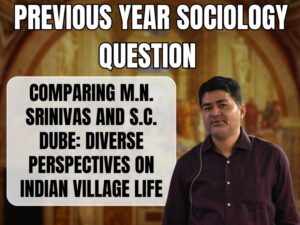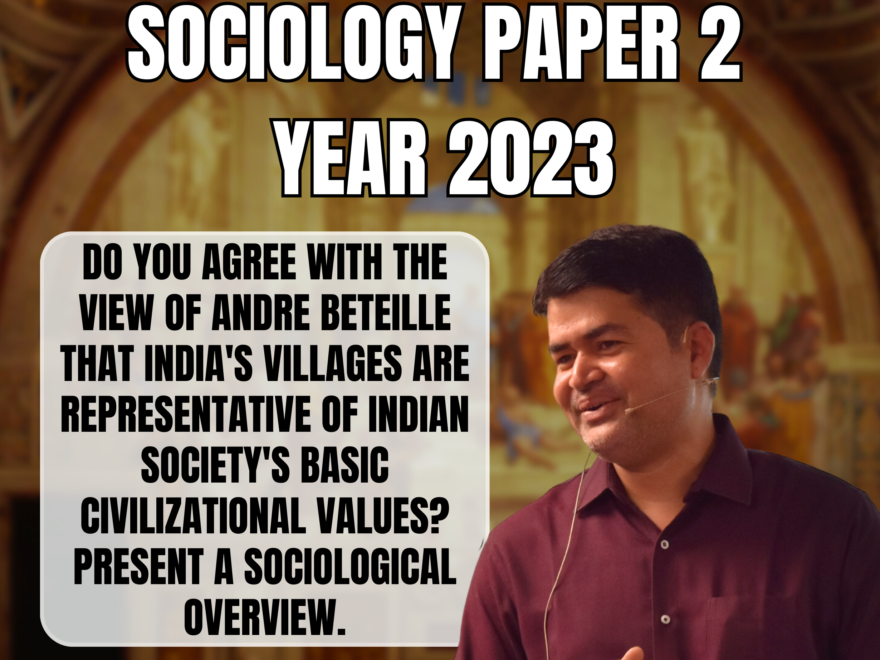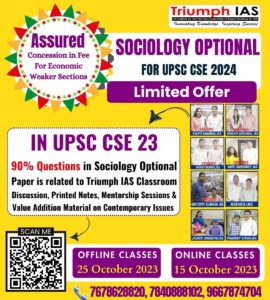Do you agree with the view of Andre Beteille that India’s villages are representative of Indian society’s basic civilizational values? Present a sociological overview.
Section: A.
Sociology Paper 2023 Analysis.
Paper 2: Unit-12 Social Structure; The idea of Indian village and village studies.

Question 2 (A): Do you agree with the view of Andre Beteille that India’s villages are representative of Indian society’s basic civilizational values? Present a sociological overview.
(20 Marks).
|
Introduction: Briefly Explain the Statement in Context of Challenge to Static and Self -Sufficient Image of Villages. Main Body: Villages as a Reflection to Indian Civilization Values, Diversion of Indian Villages From Traditional Civilizational Values. Conclusion: Highlighting that Adaptation and Evolution are Evident, the Core Values Persist. |
Introduction:
According to Andre Beteille “Village was not merely a place where people lived. It had a design in which were reflected the basic values of Indian society”. This view is rooted in the belief that villages, being the birthplaces of Indian civilization, have preserved the essence of Indian culture and traditions. This view provided dynamism to the static and self-sufficient image of villages propounded by colonial Indologists like Henry Maine , Metcalfe etc.
Main body:
Villages as a reflection to Indian civilization values:
- Hoebel has stated that the village and its hamlets represented “India in microcosm”: Each village was a distinct entity, had some individual mores and usages, and possessed a corporate unity. Different castes and communities inhabiting the village were integrated in its economic, social, and ritual pattern by ties of mutual and reciprocal obligations sanctioned and sustained by generally accepted conventions.
- Value of collective orientation:
-
- Villages often emphasize collective decision-making and a sense of community, which is reflective of broader Indian ideals of consensus, cooperation, and harmony. Notwithstanding the existence of groups and factions inside the settlement, people of the village could, and did face the outside world as an organized, compact whole.
-
- Village provided an important source of identity to its residents. They attach notions of respect, insult and pride with their village. Insult of one’s village, according to Srinivas, has to be avenged like insult of one’s father, brother and wife. Adrian Mayer termed such solidarity as ‘Village patriotism’.
- Mechanical solidarity based on the village identity: S. C. Dube highlights that village settlement, as a unit of social organization, represented a kind of solidarity which was different from that of the kin, the caste and the class.
- Reflection of traditional hierarchies: Beteille suggests that India’s villages often maintain traditional social hierarchies, including caste and class distinctions. The varna system and jatis, which are integral to India’s social fabric, are more pronounced in rural areas, and these structures have persisted over time.
- Reflection of cultural heritage: S C Dube highlights that villages reflects the ritual structure including folklore, myths , religious teaching of saints / poets and contacts with persons having knowledge of scripture and popular religious books , animism, polytheism, and even monotheism also , beliefs , ghosts , demons , witches, and magic.
- Economic aspects: the agriculture being the culture of Indian civilization is well reflected in daily life of Indian villages. The Jajamani system reflected the economic interdependence of villages people guided by traditional social values like caste.
- The civilization value of justice: the tradition of peasant struggle was major aspect of Indian villages. It is now translated into farmer struggle which also finds it origin and genesis in Indian villages; reflecting the ethos of Indian traditional civilization rooted sin value of justice.
Diversion of Indian villages from traditional civilizational values:
- Indian villages are in a state of flux. Change is coming into all the areas in villagers’ live. According to Dipankar Gupta, the Indian village is shrinking as a sociological reality, though; it exists as a spatial unit.
- In the recent years, the spread of communication media has also altered the cultural profile of the villages. Urban and modern values are penetrating villages at a speed never witnessed before.
- After independence, riding on the civic reforms, land reforms and establishment of rule of law, traditional inequalities in village came under great strain in 1950s. With the abolition villages developed a different pattern of relation with the revenue officials. New schemes of Panchayati Raj and Community Development also changed the picture of the traditional Indian village.
- Ashis Nandy, village is no longer a village in itself but a counterpoint to the city, a fantasy village for the city.
- Dipankar Gupta, in a recent article Whither the Indian Village, 2005 has argued that – ‘The twin shackles that once decided matters for India’s villagers, caste and agriculture, no longer exercise their vigorous hold’. This is largely possible because, according to him, agriculture is no longer the mainstay of rural economy and caste no longer the only determinant of social status. Fluidity of occupations, identity politics and so on, has weakened the caste as an institution.
Conclusion:
Dasgupta highlights that the village are perceived to maintain historic continuity and stability. Sociological overview of India’s villages suggests that they continue to be representative of the country’s basic civilizational values. They serve as living testaments to the enduring cultural, social, and economic principles that have shaped Indian society for centuries. While adaptation and evolution are evident, the core values persist, making Indian villages a vital and dynamic microcosm of India’s rich cultural heritage and civilizational values, as posited by Andre Beteille.
Related Blogs…
 |
 |

To master these intricacies and fare well in the Sociology Optional Syllabus, aspiring sociologists might benefit from guidance by the Best Sociology Optional Teacher and participation in the Best Sociology Optional Coaching. These avenues provide comprehensive assistance, ensuring a solid understanding of sociology’s diverse methodologies and techniques.
META TAGS:
Indian village, Civilizational Values, Andre Beteille, Sociological Overview, Indian Civilization, Traditional Hierarchies, Mechanical Solidarity, Indian Villages, Cultural Heritage, Economic Aspects, Village Patriotism, Social Hierarchy, Caste System, Collective Orientation, Economic Interdependence, Jajamani System, Farmer Struggles, Agricultural Culture, Village Identity, Social Integration, Adaptation and Evolution, Caste and Class Distinctions, Social and Economic Principles, Sociology paper 2023, Sociology Paper UPSC, Sociology paper UPSC 2023, Sociology paper CSE
Why Vikash Ranjan’s Classes for Sociology?
Proper guidance and assistance are required to learn the skill of interlinking current happenings with the conventional topics. VIKASH RANJAN SIR at TRIUMPH IAS guides students according to the Recent Trends of UPSC, making him the Best Sociology Teacher for Sociology Optional UPSC.
At Triumph IAS, the Best Sociology Optional Coaching platform, we not only provide the best study material and applied classes for Sociology for IAS but also conduct regular assignments and class tests to assess candidates’ writing skills and understanding of the subject.
Choose The Best Sociology Optional Teacher for IAS Preparation?
At the beginning of the journey for Civil Services Examination preparation, many students face a pivotal decision – selecting their optional subject. Questions such as “which optional subject is the best?” and “which optional subject is the most scoring?” frequently come to mind. Choosing the right optional subject, like choosing the best sociology optional teacher, is a subjective yet vital step that requires a thoughtful decision based on facts. A misstep in this crucial decision can indeed prove disastrous.
Ever since the exam pattern was revamped in 2013, the UPSC has eliminated the need for a second optional subject. Now, candidates have to choose only one optional subject for the UPSC Mains, which has two papers of 250 marks each. One of the compelling choices for many has been the sociology optional. However, it’s strongly advised to decide on your optional subject for mains well ahead of time to get sufficient time to complete the syllabus. After all, most students score similarly in General Studies Papers; it’s the score in the optional subject & essay that contributes significantly to the final selection.
“A sound strategy does not rely solely on the popular
Opinion of toppers or famous YouTubers cum teachers.”
It requires understanding one’s ability, interest, and the relevance of the subject, not just for the exam but also for life in general. Hence, when selecting the best sociology teacher, one must consider the usefulness of sociology optional coaching in General Studies, Essay, and Personality Test.
The choice of the optional subject should be based on objective criteria, such as the nature, scope, and size of the syllabus, uniformity and stability in the question pattern, relevance of the syllabic content in daily life in society, and the availability of study material and guidance. For example, choosing the best sociology optional coaching can ensure access to top-quality study materials and experienced teachers. Always remember, the approach of the UPSC optional subject differs from your academic studies of subjects. Therefore, before settling for sociology optional, you need to analyze the syllabus, previous years’ pattern, subject requirements (be it ideal, visionary, numerical, conceptual theoretical), and your comfort level with the subject.
This decision marks a critical point in your UPSC – CSE journey, potentially determining your success in a career in IAS/Civil Services. Therefore, it’s crucial to choose wisely, whether it’s the optional subject or the best sociology optional teacher. Always base your decision on accurate facts, and never let your emotional biases guide your choices. After all, the search for the best sociology optional coaching is about finding the perfect fit for your unique academic needs and aspirations.
Follow us :



Find More Blogs…
| Compare and contrast Karl Marx’s and Max weber’s | Karl Marx- Historical Materialism |
| Talcott Parsons : Social system | Scope of the subject and comparison with other social sciences |




One comment